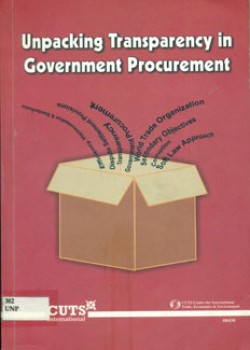
Unpacking Transparency in Government Procurement
Publisher: CUTS International
Place of Publish: India, Jaipur
Year: 2004
Page Numbers: 249
Acc. No: 1802
Class No: 382 UNP
Category: Books & Reports
Subjects: Trade
Type of Resource: Monograph
Languages: English
ISBN: 81-8257-048-4
Government Procurement (GP) in developing countries is estimated to account for 9-20per cent of the Gross Domestic Product (GDP). GP covers purchases of goods and servicesmade by the national, provincial or municipal governments and its various agencies outof their budgetary resources. GP can also be financed from aid received through bilateralor international aid programmes. The share of GP in national public finances is significant. Transparency in Government Procurement (TGP) was one of the four “new issues”included in the World Trade Organization (WTO) Ministerial Conference, 1996 held in Singapore. Procurement may be defined as the process which creates, manages and fulfils contractsrelating to the provision of supplies, services or engineering and construction works,the hiring of anything, disposals and the acquisition or granting of any rights andconcessions.Transparency, in a nutshell, needs to answer the basic question: has full information interms of the criteria that apply in the procurement process been disclosed and applied inthe procurement process? This report recognizes the fact that, a) procurement reform is not about corruption, but rather about good governance and achieving national development objectives, b) although there may be considerable agreement on the ends (efficient, non-corrupt, and transparent procurement systems), remarkably little has been published about the means to obtain them and c) there is little publicly available literature on effective replicable strategies that developing countries have adopted, or could adopt, to improve their public procurement systems. The report explores new trends in procurement and expands the knowledge base on aspects of government procurement. The report poses a number of questions that need to be answered, including the following – 1) are current procurement guidelines appropriate for low and middle income countries,2) is procurement not a barrier to trade,3) should procurement be harmonized,4) is there a role for WTO to play to promote ethical procurement practices and finally,5) what form of technical assistance and capacity building should be provided to developing countries.



